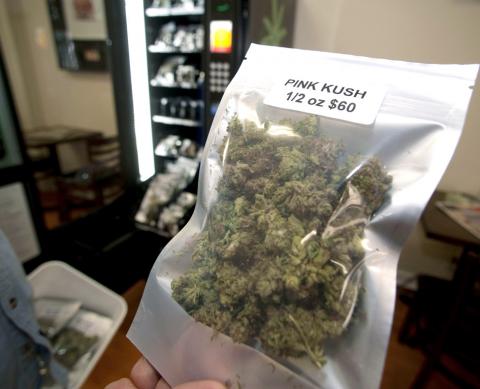The vending machines at a Vancouver storefront look ordinary — but instead of spitting out gum or snacks, for a few coins they deliver medical marijuana.
For C$4 (US$3.70), the brightly lit “gumball” machine drops a plastic ball filled with the “Cotton Candy” variety of the medicine. “Purple Kush” costs C$6.
However, proprietor Chuck Varabioff said the really good stuff, “Pink Kush,” is available from another machine the size of a fridge that delivers a wide range of marijuana in plastic bags heat-sealed for hygiene.

Photo: AFP
His British Columbia Pain Society is one of about 400 medical marijuana dispensaries in the western Canadian city.
They are all part of a booming medical marijuana industry that operates in a legal gray zone since a Canadian federal court ruling recently overturned Ottawa’s latest attempt to regulate its distribution.
Under the new regulatory regime, as of April 1, about 30,000 home-based growing operations and distributors across Canada are to be replaced by fewer but larger commercial operations.

Photo: AFP
However, many of the smaller growers and distributors, particularly in westernmost British Columbia, refused to step aside.
The drug is illegal outside of the new regime, Vancouver police said in March, but it is not one of the force’s top priorities — violent and predatory drug traffickers, gangs and hard drugs including cocaine, heroin and methamphetamine.
“Medical marijuana dispensaries operating today in Vancouver do not meet these criteria,” the police statement said.
Official city policy — and to a lesser degree British Columbia government policy — tackles all illegal drugs as a health issue instead of as criminal acts.
The use of marijuana for medicinal purposes was effectively legalized in Canada in 1999 and its use has been expanded through a series of court challenges.
The dispensaries are relatively new. For generations, cannabis has been produced and sold here as a street drug, including by gangs, and fueled a vibrant underground economy. A decade-old study by an economist for the libertarian Fraser Institute think tank estimated marijuana’s street value at C$7 billion a year in British Columbia.
Back at the British Columbia Pain Society, customers have to be 19 or older, and are required to show a signed form from a medical professional — such as a physician or naturopath — to enter the fenced area where the marijuana is sold. They can take their purchase away, or smoke it at a large table with an air filtration system.
Justin Johnson sat there and inhaled from a glass water pipe.
“I feel stoned, slightly euphoric, a little anxious,” he said with a little smile. “And immediately all the pain I have is gone.”
Johnson said he has relied on marijuana to reduce pain since injuring his back in his former job as a chef. He is now a medical marijuana advocate and setting up a storefront for the Society.
Varabioff hopes to install marijuana vending machines in nursing homes and medical clinics.

Eleven people, including a former minister, were arrested in Serbia on Friday over a train station disaster in which 16 people died. The concrete canopy of the newly renovated station in the northern city of Novi Sad collapsed on Nov. 1, 2024 in a disaster widely blamed on corruption and poor oversight. It sparked a wave of student-led protests and led to the resignation of then-Serbian prime minister Milos Vucevic and the fall of his government. The public prosecutor’s office in Novi Sad opened an investigation into the accident and deaths. In February, the public prosecutor’s office for organized crime opened another probe into

RISING RACISM: A Japanese group called on China to assure safety in the country, while the Chinese embassy in Tokyo urged action against a ‘surge in xenophobia’ A Japanese woman living in China was attacked and injured by a man in a subway station in Suzhou, China, Japanese media said, hours after two Chinese men were seriously injured in violence in Tokyo. The attacks on Thursday raised concern about xenophobic sentiment in China and Japan that have been blamed for assaults in both countries. It was the third attack involving Japanese living in China since last year. In the two previous cases in China, Chinese authorities have insisted they were isolated incidents. Japanese broadcaster NHK did not identify the woman injured in Suzhou by name, but, citing the Japanese

RESTRUCTURE: Myanmar’s military has ended emergency rule and announced plans for elections in December, but critics said the move aims to entrench junta control Myanmar’s military government announced on Thursday that it was ending the state of emergency declared after it seized power in 2021 and would restructure administrative bodies to prepare for the new election at the end of the year. However, the polls planned for an unspecified date in December face serious obstacles, including a civil war raging over most of the country and pledges by opponents of the military rule to derail the election because they believe it can be neither free nor fair. Under the restructuring, Myanmar’s junta chief Min Aung Hlaing is giving up two posts, but would stay at the

YELLOW SHIRTS: Many protesters were associated with pro-royalist groups that had previously supported the ouster of Paetongtarn’s father, Thaksin, in 2006 Protesters rallied on Saturday in the Thai capital to demand the resignation of court-suspended Thai Prime Minister Paetongtarn Shinawatra and in support of the armed forces following a violent border dispute with Cambodia that killed more than three dozen people and displaced more than 260,000. Gathered at Bangkok’s Victory Monument despite soaring temperatures, many sang patriotic songs and listened to speeches denouncing Paetongtarn and her father, former Thai prime minister Thaksin Shinawatra, and voiced their backing of the country’s army, which has always retained substantial power in the Southeast Asian country. Police said there were about 2,000 protesters by mid-afternoon, although